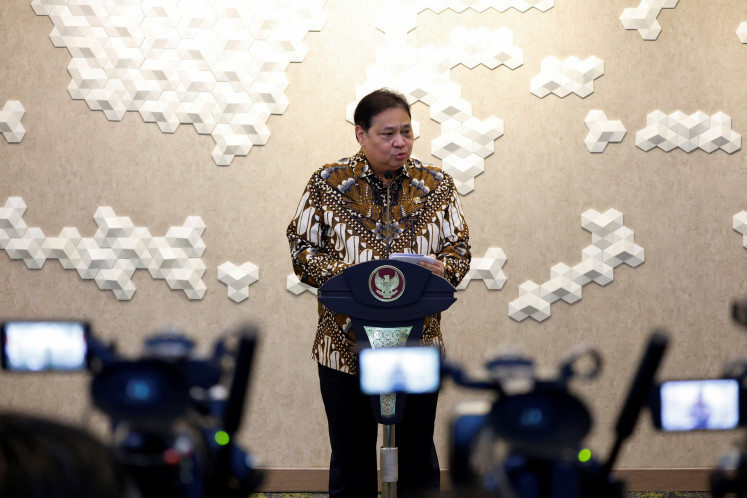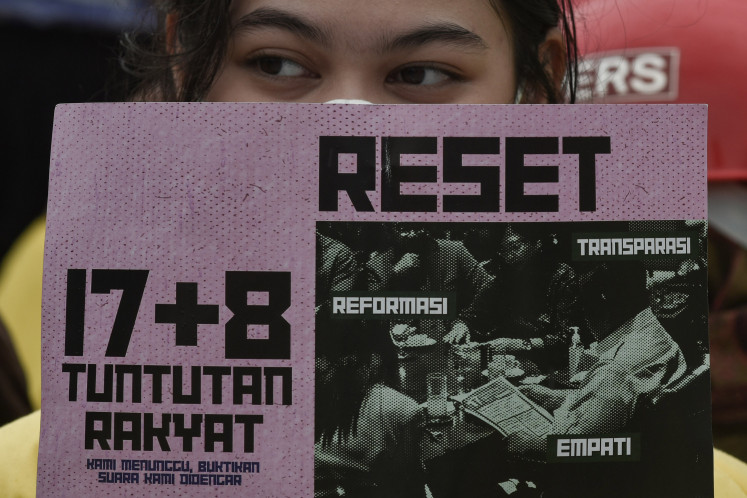Popular Reads
Top Results
Can't find what you're looking for?
View all search resultsPopular Reads
Top Results
Can't find what you're looking for?
View all search resultsRenewed confidence in Cancun
When delegates assembled in Cancun on Nov
Change text size
Gift Premium Articles
to Anyone
W
hen delegates assembled in Cancun on Nov. 29 for the 16th Conference of the Parties to the UN Framework Convention on Climate Change, expectations were not high. Fresh in their minds was the memory of disappointed hopes in Copenhagen this time last year.
But in the early hours of Saturday morning, the Cancun Agreement was adopted, to the delight and relief of over 190 countries who believe in the importance of a global deal to tackle climate change and in the UN process as a way of achieving it.
The Cancun Agreement covers progress on a wide range of measures. Decisions were reached on bringing details of both developed and developing countries’ actions to reduce emissions into the UN system and developing systems for measuring, reporting and verifying emission reductions and actions in line with countries’ commitments. The conference agreed the establishment of a Green Climate Fund to support policies and activities in developing countries.
Decisions were also reached on reducing deforestation. The UK was pleased with the outcome on REDD+, which agreed on the need to take ambitious collective action to reduce emissions from deforestation in developing countries and the process and rules by which to do so.
Deforestation is a major source of emissions, with the Intergovernmental Panel on Climate Change (IPCC) estimating that deforestation and associated land use change, including peatland, was responsible for 17 percent of global greenhouse gas emissions in 2005.
The IPCC holds the most broadly accepted and widely scrutinized body of evidence on climate change, and the desire to make progress on REDD+ at Cancun clearly demonstrates the importance that countries attach to this evidence.
The decisions taken at Cancun provide a solid foundation for further work in the years ahead. For the first time, there is an international commitment to “deep cuts in global greenhouse gas emissions” to hold the increase in global average temperature below 2 degrees Celsius. This includes processes for adopting targets for peaking emissions as soon as possible, and substantially reducing them by 2050.
But the most important aspect of the Cancun Agreement is that it sends a very clear and positive message: The UN process is back on track, and with renewed momentum. The international community has sent a clear signal of our intention to tackle climate change. Governments and businesses will be emboldened to take the action needed to prevent dangerous climate change threatening our global security and prosperity and move towards a low carbon path.
Indonesia continues to play an important role in international climate change negotiations. The President’s commitments to reduce emissions by up to 41 percent from business as usual by 2020 have helped to keep ambition high amongst other developing countries as well as keeping up the pressure on the developed world.
We are extremely grateful for the importance that Indonesia attaches to these negotiations, and we hope that Indonesia will be increasingly vocal in support of a legally binding global agreement as we work towards the next climate conference in Durban at the end of 2011.
Equally, the UK is ready to work with Indonesia to help deliver its emissions reduction targets and thereby contribute towards the 2 degrees goal agreed in Cancun. The UK supports the aims of the REDD+ Partnership agreed by Norway and Indonesia earlier this year, and with the second largest tropical rainforest in the world and a deforestation rate of almost 1.3m hectares per year, it is essential that deforestation rates are reduced if we are to effectively tackle climate change.
Reducing planned deforestation can be achieved without harming Indonesia’s economic progress. For example, estimates suggest that Indonesia could meet its target of producing 40 million tons of crude palm oil per year without any further forest conversion – instead focusing on increasing productivity on existing plantations and limited expansion on already-degraded land.
The agreement on REDD+ at Cancun will help to set the stage for this shift onto a low carbon economic path. There are also important co-benefits of reducing deforestation, including for biodiversity, environmental services and poverty reduction.
In the UK, the coalition government will continue to press forward to meet our target of at least a 34 percent reduction in emissions on 1990 levels by 2020. We intend to demonstrate how a successful and prosperous low-carbon economy can be developed in the UK and EU, providing employment, exports and energy security – and reducing emissions.
An Energy Bill has been presented in Parliament which would radically transform the energy efficiency of Britain’s housing stock as well as help employ up to 250,000 people in the next decade. And Chris Huhne, the Energy and Climate Change Secretary, has also published plans for far reaching reforms to our electricity markets to incentivize business to provide the billions that needs to be invested into green energy production.
The Cancun Agreement represents a triumph for the spirit of international co-operation in tackling an international threat. There remains much to do in the run-up to the 2011 climate conference in Durban and beyond, but given we can now approach it with renewed confidence and ambition.
Indonesia could meet its target of producing 40 million tons of crude palm oil per year without any further forest conversion.
The writer is Charge d’affaires, British Embassy, Jakarta










